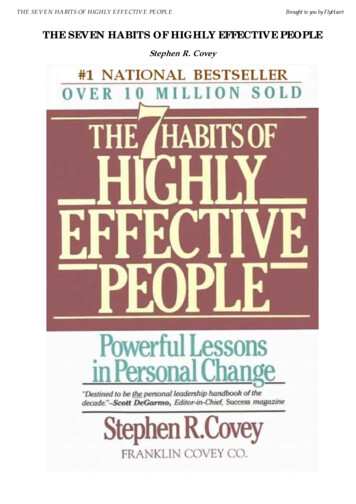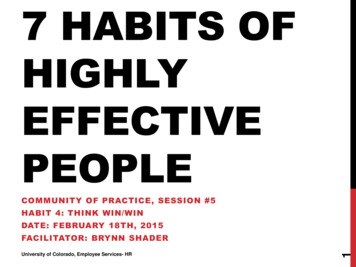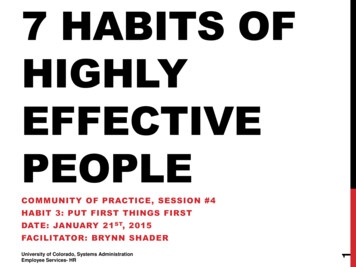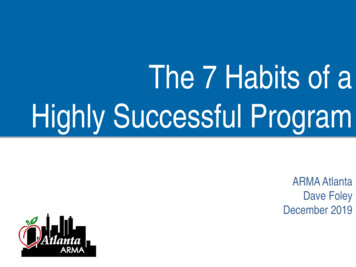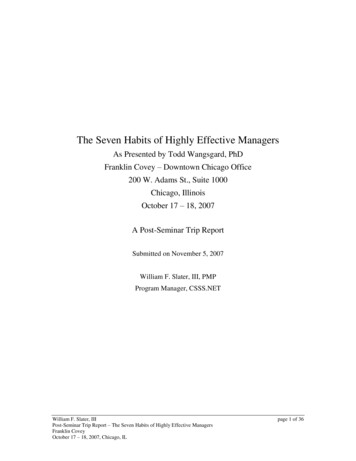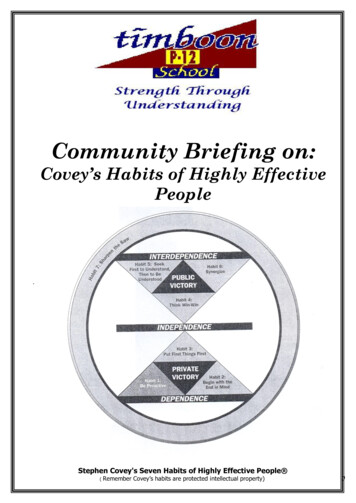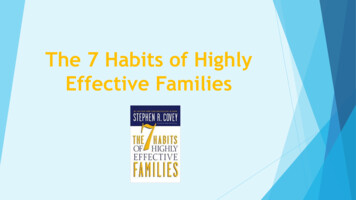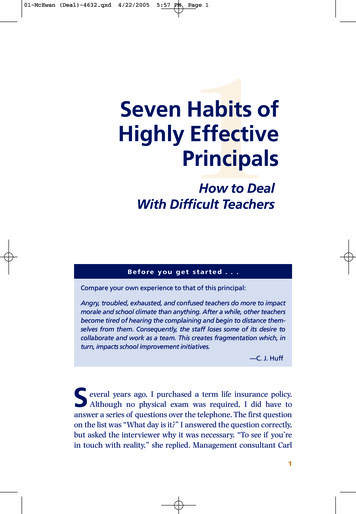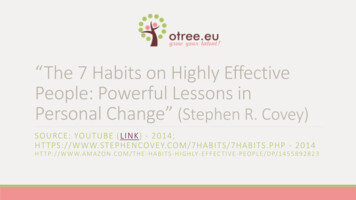
Transcription
UCLAScholarship Resource CenterS T R AT E G I E SWINTER 2018 / VOL. 23 NO. 2The 7 Habits of Highly Effective Scholarship ApplicantsBy Mac Harris, SRC Staff1. Be Proactive.No matter who you are and no matter what yourbackground, there are scholarships out therewaiting for you to win them. The trick is takingthe initiative to find those scholarships. The mosteffective students we encounter at the ScholarshipResource Center frequently use our library ofscholarship books to search for new scholarshiplistings.2. Stick to a Schedule.The most successful scholarship applicants treatthe process like a class or a research project: theyset particular days and times each week when theywork on scholarships, whether searching for newones or working on an existing application. Evenif that means only 1-2 hours per week, sticking toa scholarship schedule keeps you on top ofdeadlines and ensures a higher quality for yourapplication than a last-minute binge strategywould.3. Get Organized.Keep a list of the scholarships that most interestyou, whether as an Excel document or on a pieceof paper. Be sure to record the key informationabout each one—the deadline and therequirements (essay, letter of recommendation,transcript, etc.). Keep your scholarship materials,especially your essays, together with that list, sothat you will have them when you need them.4. Know Your Teachers.When the time comes to request a letter ofrecommendation for a scholarship, the mosteffective applicants do not need to squirm aboutwhether or not they should ask their TA orprofessor to write one, because they have alreadyestablished relationships with TAs and professorsby occasionally attending office hours to askquestions or advice (no need to stalk). They alsogive their recommenders plenty of time inadvance of the deadline since they know howbusy those TAs and professors are.5. Read ApplicationsCarefully.Most scholarship applications yield importantinsights into the kind of student they want toreward, if you read them carefully. Some willeven describe the basis on which they willevaluate your essay(s). It is also a great idea to gobeyond the application and do some research onthe people and/or organization offering thescholarship. What are their backgrounds andinterests? They are probably looking to reward astudent who complements those.6. Seek Help.Highly effective scholarship applicants are not anisland. They ask other people to read and critiquetheir scholarship essays. At UCLA, theyespecially take advantage of the writing help onscholarship essays offered by the ScholarshipResource Center, and make appointments withstaff members to help brainstorm for their essaysand review drafts. Inside this issue:Habits ofScholarshipWinners1Don’ts for LORs 2Analyzing YourFirst Draft3Spotlight on aScholarshipWinner4-5ScholarshipWordSearch6Phi Beta KappaFAQ7SRC WorkshopSchedule87. Keep Tinkering.You can always improve your application andHave you won ayour profile to give them a better chance. Whileit is a good idea to recycle scholarship essays to scholarship with thecut down on your workload, keep looking forhelp of the SRC?improvements you can make to those old essays.Let us know!If your community service record seems toominimal to apply for many scholarships,src@college.ucla.educonsider joining a community-servicestudent group that appeals to you .
PAGE 2STRATEGIES WINTER 20184 Don’ts For Your Letter of RecEveryone needs a letter of recommendation at somepoint – whether it’s for a scholarship, internship,grad school, or another program. Asking for letterscan be anxiety-provoking, which is one of the reasons theSRC offers workshops on Letter of Recommendation everyquarter. (Please see our schedule on p.8!) There, we coverimportant basics: what the purpose of a letter of rec is, what astrong letter should include, how to ask for a strong letter, andwhat materials to give your letter writers so they have theinformation they need.Savvy applicants will also want to make sure they’re steeringclear of the following missteps – the things you should seriously, seriously NOT do when seeking a recommendation.1. Don’t wait until the last minute to ask for a letter.Understand that your letter writers are busy – especially atcertain times of year. Note that a lot of deadlines forscholarships and grad school fall around the same time as finals/grading. Your professors and TAs will be busy so beconsiderate and give them plenty of time. They will be happier to write for you if you give them enough time to do it.2. Don’t ask someone who doesn’t know you well.A letter that doesn’t include details or that suggests the writerdoesn’t really know you can really work against you. Thismeans that it doesn’t make sense to ask someone famous justbecause they’re famous or important: they also must knowyou and be able to write about your skills, abilities, and howyou meet the program’s criteria.3. Don’t neglect strategy.This can tough, because sometimes it’s hard just to think ofenough people who know you well enough to write agood letter! (Especially early in your UCLA career.) Butthink about what the application is asking for, and which recommenders may be best able to address those criteria. For example, if the scholarship emphasizes research, be sure thatyou have a letter from someone who can comment on yourresearch skills (and who has worked with you in a researchsetting). If the award is focused on leadership and communityservice, consider asking the person who has supervised yourwork in the campus or community organizations you workwith, and who will be able to discuss your impact. If the scholarship is for History students, ask your History professor. Thinkstrategically.4. Don’t be pushy.If someone tells you they can’t write you a letter (or doesn’tfeel comfortable doing so), don’t push! They’re doing you afavor. It’s much better to learn beforehand that a professordoesn’t feel comfortable writing you a strong letter than tolearn that after the fact – when you get turned down for thescholarship because the letter was weak or lukewarm.Related, once someone agrees to write, don’t be aggressivewith your follow-up. If it’s getting close to the deadline, theletter hasn’t been submitted, and you’re anxious, checkin politely. And always send a thank you note.
PAGE 3STRATEGIES WINTER 20185 Questions for Analyzing your First DraftBy Rebecca A. Lippman, SRC StaffThe most common question that I have when readinginitial drafts of my students’ personal statements is“What is your argument?”Most students do not realize that the process ofwriting a scholarship application is a form of argumentationor persuasion. It’s impossible to identify all of the elements ofa strong argument in a first draft. The best arguments usuallyappear in later drafts when you have a clearer sense of whatinformation to include and exclude. Through critical analysisand revision you will strengthen your argument and increaseyour chances of winning.The goal of draft analysis is to consider only the text that youhave already written, not the grand ideas that you wish you’dwritten. Don’t try to start re-writing your draft while you’reanalyzing it. Pretend that you are someone like me: an outsidereader who wants to get a quick sense of what is on the page(not what’s in your head).Re-read your draft and ask yourself the following fivequestions. Then make a list or color-code the parts of theessay that answer each of these questions. If you are missingsome of the answers, make a list of facts and ideas you wantto include in the next draft.1. What specific facts do I share regarding my immediategoals, and long-term future?A strong argument is one that shows the committee that if youreceive funding to achieve your short-term goals, then you’llbe more prepared to have an impactful long-term future. Soyou have to define both types of future goals.2. Do I clearly explain how my sense of identity, pastexperiences, skills, and accomplishments make me the rightperson to achieve the goals I’ve set for myself?A clear argument will only include pieces of information thatare necessary to show that you are a person who is capable ofand passionate about accomplishing the specific goals thatyou have set for yourself. You can cut everything else out.If an organization is looking for candidates from a specificcommunity, you can bet that the organization understandshow incredibly diverse that community can be. Through yourstatement you have a chance to show or explain what“identity” means through the specificity of your own life andexperiences, which means you get to define, describe, or evenchallenge common definitions of your community.5. Is there a sentence that clearly states the relationshipbetween my goals and the goals of the organization? Do Iexplain how my goals will benefit other people ororganizations?Be as specific as possible about why your goals matter. Forexample:Research-Related Essay:Weak: My work will save the world from sickness.Stronger: My contribution to research about machinelearning as a tool for analyzing medical photography willhave an impact in communities outside of the lab.Community-Based Essay:3. How do I explain to the reader that there is a personalmotivation behind my future goals?Weak: I want to give back to my community as a futurelawyer.The importance of bringing up the past is to show that youhave thought carefully about why you want to accomplish thegoals you have identified. If there is no relationship betweenthe past that you describe and your motivation to accomplishcertain goals, then you are likely telling the wrong story.Stronger: Completing fieldwork as a Sociology major willprepare me to train as a lawyer who is critical of the socialdynamics of the law in the daily lives of people in mycommunity.4. Do I describe or define my sense of identity? How is myidentity related to the mission of this particular fundingorganization?Once you’ve carefully considered the content of your essay,write a new draft!
PAGE 4STRATEGIES WINTER 2018Spotlight on a Winner:Latrice White, UCLA Travel Study Scholarship WinnerBy Grant Rosson, SRC StaffIf you are thinking about studying abroad this summer,you might consider following the example of LatriceWhite. Last summer, Latrice studied in Hong KongUniversity’s Business Leadership and Communicationprogram on UCLA Travel Study Scholarship. As part of herscholarship, she now works as a Travel Study OutreachCoordinator for the International Education Office. We askedLatrice to share some of her experiences, to give students asense of what it takes to win a travel study scholarship, whatstudent life abroad is like, and what you can do to takeadvantage of UCLA’s great study abroad opportunities. If herstory inspires you, reach out to the SRC, just like Latrice did,and start funding your study abroad adventure today!SRC: We’d like to get to know you. Can you tell us aboutwhat you are studying at UCLA?Latrice: I’m a second-year studying Business Economics – butI am probably going to switch into International DevelopmentStudies with a Global Studies minor, since I want towork in international business. Business Economicsfocuses on economics, but with IDS I’ll get a moreholistic view of socio-economics, especially with theGlobal Studies minor added to it.SRC: Can you tell us a little bit about the travel studyprogram you went on?L: It was a 28-day program called the “Business Leadershipand Communications” program. We took two classes. Onewas called “Strategic Communications” and one was called“Business Leadership.” Both were taught by the sameprofessor, two to three times per week, usually early in theweek so that we could have the rest of the week to explore andtravel.SRC: And how were the classes different from classes atUCLA?L: At UCLA classes are more theory based, at least for me,because I’m a north campus major. But in Hong Kong, theywould show us how to do something, like a persuasionpresentation for example, and then we would actually have todo it. Our teacher organized a party where all these UCLAalums who work in international business came, and he told us to usethe event to practice the “business storytelling” strategies that we hadbeen learning. So, he taught us to communicate, and then we would goout immediately and do it.SRC: Did you feel like you could have taken these classesanywhere, or were they tailored specifically to Hong Kong?L: The professor incorporated Hong Kong and Chinese cultureinto all the content of the class, so Hong Kong was a casestudy for the principles we were learning. We weren’t taking aclass about Hong Kong, but we were taking a class in HongKong, so it naturally became part of the class. And when westepped outside the classroom, we would see examples of allthe things that we learned in class. So the class helped us seedifferent aspects of the culture we were living in.SRC: And did the program give you a better sense of whatyou want to do after you graduate, or what part of the worldyou want to work in?L: I’m keeping an open mind! But I was really inspired by theprofessor who taught my travel study program. He has a majorconsulting firm, and he taught us all about the methods heuses when he is consulting with big companies. One of thecompanies that he consulted with was the Hong Kong MassTransit Railway System, which is a major thing thateverybody in Hong Kong works with. He was really wellconnected. Our TA was really helpful too. He worked for anemployment agency, so he would constantly let us know aboutjob opportunities he heard about all around the world. So if Iever need a job after graduation, I’ll know who to call!Continued on p.5
PAGE 5STRATEGIES WINTER 2018Cont’d:Travel Study Scholarship WinnerSRC: And now that you’re back, what are you up to?L: I am working as the Outreach Coordinator for theInternational Education Office, since that’s part of myscholarship. So far, I have been organizing and working at a lotof events. For International Education Week, for example, myfellow coordinators and I put up fliers and worked at differentstations to talk with students and give information aboutstudying abroad.SRC: What kind of questions do students usually ask abouttravel study?SRC: What are some of the “Outreach” ideas you areworking on?L: One of my proposals is an international game night, sincegames are a fun way for people to connect and learn whileplaying games from around the world. I’m planning that now.My target audience is first-year students and internationalstudents, but any student who wants to study abroad will bewelcome. I’m planning that now, and it will be in either winteror spring, so people should keep an eye out for that.SRC: What would you tell students who are interested instudying abroad?L: They usually ask about financesand how long the programs are. A lotof students think that studying abroadtakes up your whole summer, but myprogram was only 28 days. So you canstudy abroad, then come back and doan internship or do summer sessions atUCLA. It doesn’t take up your wholesummer, like some people think.L: Don’t be afraid to go anywhere. Ioriginally applied to go to Greece,Don’t be afraid to pushbecause I’ve studied it and it seemedyourself to explore or do fun. But that trip was cancelled, andthe study abroad advisor had to helpthings that maybe youme find a new program. When shewouldn’t do otherwise.suggested Hong Kong, I was like “Ah!I don’t know anything about HongKong!” But now looking back, I cansay, definitely take advantage of all the possibilities, even theones you’re not sure about. Because now I think Hong KongSRC: What are some resources for financing travel study?is so amazing. Don’t be afraid to push yourself to explore or dothings that maybe you wouldn’t do otherwise.L: The International Education Office offers a fewscholarships, like the one I did, the Summer Travel StudiesScholarship, the Global Citizens Scholarship, and another one SRC: That’s great advice. Any other thoughts to leave ourfor creative bloggers. But students should also check out thereaders with?Scholarship Resource Center, for the big binder of studyL: I would just tell people to plan early, and research all ofabroad scholarships and their pamphlets about scholarshipyour options. There is UC Travel Study, but there is also UCsearch engines.Education Abroad which is for the entire UC system, and thereare outside study abroad programs as well. Seek out everyMy scholarship specifically was the Summer Travel Studyoption available and see how you could benefit from it and putScholarship, which pays the tuition for your program, exceptfor airfare and books, and it refunds you the initial application it to good use. Don’t be afraid to go for it. Just do it!deposit. There are two tracks you can take for that scholarship.One is the “Outreach Coordinator,” which is what I do, where I Plan a visit to the Scholarship Resource Center totry to get people interested in studying abroad and going to ourexplore our study abroad resources, including scholoffice and talking to our advisors. The other is the “Outreacharship search engines and a binder full of opportuniCorrespondent“ track, for artistic people, who like to blog,ties all over the world. Our staff would be happy tocreate pamphlets, take pictures. You have to write two essaysassist you with your plans!and four proposals of cool ideas for getting people interested instudying abroad. Follow us! Facebook.com/UCLASRCAnd find our updates on Twitter: @uclasrc
PAGE 6STRATEGIES WINTER 2018Scholarship Word Search!!Finding scholarships requires searching HIGH and low, UP and down, diagonal, forwards and sdrawkcab.The right opportunity for you is out there—you just have to go and find it!Get some searching practice right now with this nifty Word Search.After you have found all the words below, SEARCH for our office on campus to find out more!Our friendly staff can help you navigate your way to success!!Search TermsUCLA Mortar Board SocietyJim MurrayUndergraduate Research PortalHispanic Scholarship FundCovel CommonsBeinecke ScholarshipPhi Beta KappaUnigoFAFSASearch Apply WinBONUS: Bring in your completed word search puzzle for a free scholarship consultation! (LOL, they're always free.)
PAGE 7STRATEGIES WINTER 2018Phi Beta KappaBy Jeremy Schmidt, SRC StaffWhat do Peyton Manning and Ruth Bader Ginsburg have in common? How about W. E. B. Du Bois and Sheryl Sandberg? Or actress Glenn Close and biochemist Roger Tsien? All six—along with 17 U.S. Presidents, 37 other SupremeCourt Justices, and more than 130 Nobel Laureates—are members of the Phi Beta Kappa Society.Φ What is Phi Beta Kappa?The main purpose of PBK is to recognize students who have achieved distinction in both the liberal arts and thesciences. Formed in 1776 during the American Revolution at the College of William & Mary, PBK takes its namefrom the Greek initials for the ancient motto, “Love of learning is the guide of life.” It remains the oldest and mostrespected academic honors society in the country.Φ What are the benefits of Phi Beta Kappa?Employers, professional schools, and graduate programs view election into PBK as a competitive advantage and amark of personal distinction. Members also have full access to the programs and opportunities directed by the nationalPBK network: scholarships, awards, lectureships, publications, the renowned Visiting Scholars program, and numerous initiatives with partner institutions.After graduation, members may join PBK associations in their communities. These organizations bring togethermembers of all ages, offering a wide range of educational programs, community service projects, and networking opportunities. The PBK Alumni of Southern California, for example, offers scholarship opportunities for new memberspursuing graduate study and international students attending graduate programs in California.Φ How do I become a member of Phi Beta Kappa?You do not need to apply in order to be considered for PBK. The Degree Progress Report of any senior who meetsminimum GPA standards (3.67-3.85, depending on the number of credits completed) will be forwarded automaticallyto the UCLA PBK Council.The Council looks for transcripts that demonstrate that a student has (1) completed at least 120 units of coursework in the traditional disciplines of the natural sciences, mathematics, social sciences, and humanities; (2) pursuedambitious courses in different branches of the liberal arts and sciences; (3) demonstrated intermediate facility in a second language; and (4) completed at least one course in mathematics, logic, or statistics.For precise information about eligibility criteria, the nomination process, and the benefits of PBK, visit the websites for the UCLA campus chapter (scholarshipcenter.ucla.edu/phi-beta-kappa) and the nationwide organization(www.pbk.org/). Then, stop by the SRC office to discuss your eligibility. If you believe you’re a candidate for nomination buthaven’t received an email notification by the end of April of your senior year, contact the SRC’s PBK officer at (310) 825-4112 orpbk@college.ucla.edu.INTERESTED IN SPORTS JOURNALISM?Write an essay on a topic related to UCLA’s sports history! 5,000Are you looking forto help pay your way through school?Are you a sophomore or junior in good standing (with a GPA of 3.0 or above)?Then what are you waiting for? You are eligible for:THE JIM MURRAY FOUNDATION SCHOLARSHIPFor more information or an application, drop by the UCLA ScholarshipResource Center, 11 a.m. – 6 p.m., M-F, or call us at (310) 206-2875.Campus deadline is in April.
PAGE 8STRATEGIES WINTER 2018Take advantage of these GREATscholarship resources: Extensive Library Workshops Every Quarter Scholarship Website One-on-one Counseling Writing Assistance Scholarship Search MentoringIt’s all waiting for you at theUCLASRCScholarship Resource Centerguiding UCLA students throughthe scholarship process233 Covel Commons(310) 206-2875Scholarship Resource CenterWinter 2018 Workshop ScheduleAll workshops are held in Covel 229 and include apersonalized follow-up counseling session.Sign up for a workshop through MY.UCLA.EDU.Secrets to Winning College CashJan 9Tuesday5:00-5:30 PMJan 18Thursday5:00-5:30 PMJan 22Monday4:00-4:30 PMFeb 7Wednesday5:00-5:30 PMFeb 14Wednesday4:30-5:00 PMFeb 20Tuesday5:00-5:30 PMJan 10Feb 2How to Win ScholarshipsWednesday5:00-5:30 PMFriday5:00-5:30 PMJan 16Feb 1How to Find ScholarshipsTuesday5:00-5:30 PMThursday5:30-6:00 PMOpen Monday to Friday11 am—6 duFollow us to getalerts aboutupcomingscholarships!Facebook.com/UCLASRCHow to Write Personal StatementsJan 25Thursday5:00-6:00 PMFeb 13Tuesday5:00-6:00 PMHow to Get Letters of RecommendationFeb 8Thursday4:30-5:00 PMFeb 22Thursday5:00-5:30 PMSpecial Event! SRC and ORL Kick Start Your Scholarship Search.Tues, Jan 23. 7 pm. Covel Grand Horizon Room.Bring your laptop and a friend!
The 7 Habits of Highly Effective Scholarship Applicants By Mac Harris, SRC Staff 1. Be Proactive. No matter who you are and no matter what your background, there are scholarships out there waiting for you to win them. The trick is taking the initiative to find those scholarships. The most ef
